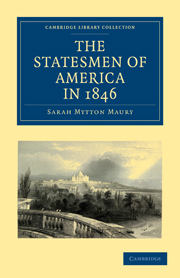Book contents
- Frontmatter
- Contents
- THE PRESIDENT AND PEOPLE OF THE UNITED STATES
- JAMES BUCHANAN
- WILLIAM HENRY SEWARD
- WILLIAM H. HAYWOOD
- HUGH WHITE
- JOHN Y. MASON
- ABBOTT LAWRENCE
- THOMAS H. BENTON
- SAMUEL D. HUBBARD
- MARTIN VAN BUREN
- ROBERT C. WINTHROP
- ROGER B. TANEY
- JOHN M'LEAN
- DANIEL WEBSTER AND RUFUS CHOAT
- EDWARD A. HANNEGAN
- JOHN QUINCY ADAMS
- ALBERT GALLATIN
- OREGON AND CANADA, REMARKS ON
- CHARLES JARED INGERSOLL
- EDMUND GAINES
- MATTHEW FONTAINE MAURY
- JOHN CALDWELL CALHOUN
- HENRY CLAY
- RIGHT REV. JOHN HUGHES, CATHOLIC BISHOP OF NEW YORK
- NOTE ON THE CORPS DIPLOMATIQUE AT WASHINGTON
- ON COMMERCE
- ESSAY ON FREE TRADE, BY THE AUTHORESS
- THE CATHOLIC CHURCH IN OREGON
- NOTES ON THE MEXICAN WAR
ESSAY ON FREE TRADE, BY THE AUTHORESS
Published online by Cambridge University Press: 29 August 2010
- Frontmatter
- Contents
- THE PRESIDENT AND PEOPLE OF THE UNITED STATES
- JAMES BUCHANAN
- WILLIAM HENRY SEWARD
- WILLIAM H. HAYWOOD
- HUGH WHITE
- JOHN Y. MASON
- ABBOTT LAWRENCE
- THOMAS H. BENTON
- SAMUEL D. HUBBARD
- MARTIN VAN BUREN
- ROBERT C. WINTHROP
- ROGER B. TANEY
- JOHN M'LEAN
- DANIEL WEBSTER AND RUFUS CHOAT
- EDWARD A. HANNEGAN
- JOHN QUINCY ADAMS
- ALBERT GALLATIN
- OREGON AND CANADA, REMARKS ON
- CHARLES JARED INGERSOLL
- EDMUND GAINES
- MATTHEW FONTAINE MAURY
- JOHN CALDWELL CALHOUN
- HENRY CLAY
- RIGHT REV. JOHN HUGHES, CATHOLIC BISHOP OF NEW YORK
- NOTE ON THE CORPS DIPLOMATIQUE AT WASHINGTON
- ON COMMERCE
- ESSAY ON FREE TRADE, BY THE AUTHORESS
- THE CATHOLIC CHURCH IN OREGON
- NOTES ON THE MEXICAN WAR
Summary
Commerce is an affair of climate;—and the Sun, the disseminator of light and heat is its regulating power. These gifts of his are dispensed in various degrees of duration and intensity, according to the various positions of the countries of the globe. This is a law of nature. In like manner soil and production are suited to each other, and to the position or climate which they occupy upon the earth. This also is a law of nature.
“God Almighty first planted a garden;” and the first pursuit of an infant people is Agriculture. Until that period arrives, when, owing to the improvements in agriculture, a portion of the people is able to cultivate sufficient for the consumption of the whole, so long must the inhabitants of any country continue to be purely agricultural; and so long must they remain satisfied with the products of their own soil. But when population increases, and labour becomes redundant, adventure commences, and Commerce begins to occupy a portion of their attention; then they seek the variety of productions which is found in other countries. They exchange their own abundant and familiar articles for the novelties of another land. This Barter was originally and practically Free Trade, in its earliest and simplest form. It supposed and developed not only the obvious advantage arising from a mere exchange of commodities, but the latent advantage resulting from the profitable employment of the (otherwise useless) surplus home production, in procuring the surplus of foreign production.
- Type
- Chapter
- Information
- The Statesmen of America in 1846 , pp. 535 - 542Publisher: Cambridge University PressPrint publication year: 2009First published in: 1847



